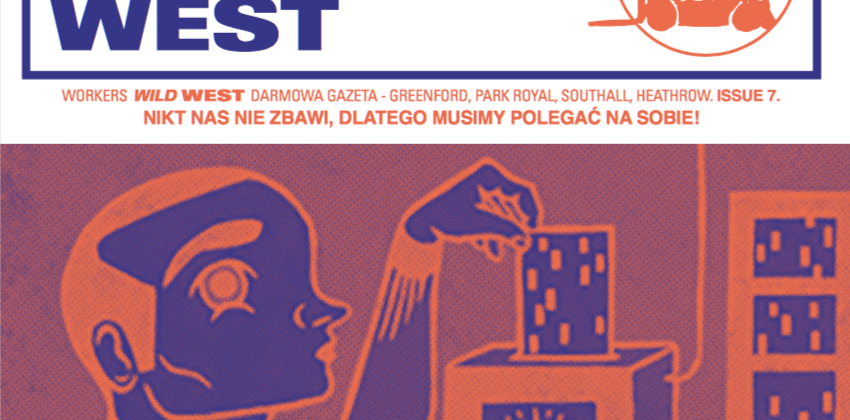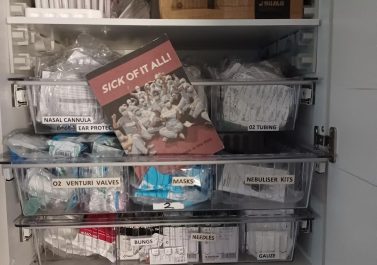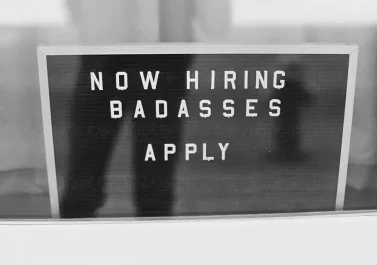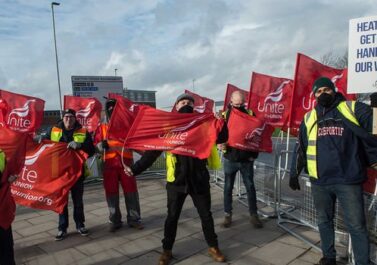Issue no.7 of our local workers’ newspaper – find two articles below, for remaining articles see PDF above.
MANY FACES! – SNAPSHOTS FROM DISTRIBUTING WORKERSWILDWEST
Sainsbury’s Superstore, Ladbroke Grove, Nightshift worker
“The guys on the older contracts were called in by management and it was announced that they will cut our break time during nightshift. People were angry, but then also scared to do something. Some weeks later the Sainsbury’s higher-up management announced that they will reduce the number of store managers by more than half.”
Brakes, Premier Park, Park Royal, Warehouse worker
“I work on night-shift. Workers do voice- controlled pick in ambient, chiller and freezer. You have to wear a head-set and a computer voice tells you what to pick. The pick-rate has been increased from 160 to 170 pieces per hour recently. We are paid around £11 for nights.”
24-hour Asda supermarket in Park Royal, Cafe worker
“They recently cut our hours and at peak times it is not enough to have just two people working here.”
Millenium Food, Metropolitan Park, Greenford, Agency worker
“ASAP agency sent me to this factory last autumn. They make pizza bases, amongst other things. The agency fork-lift drivers were paid only £7.50. The work is stressful, they make you operate different machines at the same time – machines that flatten dough balls.”
Amazon Flex, West-Drayton, PMP Agency worker
“After the peak-season they cut the weekly working time from 40 hours to 30 hours. At the same time it is difficult to take time off in emergencies, they give you trouble for it.”
Wealmoor, Fruit and Veg warehouse, Greenford, worker
“We have problems with getting our holidays, management allocated holidays arbitrarily. It is also a disgrace that night- shift workers still only get £8 – and 12 hour shifts are heavy.”
EBP factory, Park Royal, Production worker
“Management knows that people are not too happy, because wages are low. Even after 10 to 15 years, you are still close to the minimum. Atmosphere was bad around Christmas, so management announced a £100 bonus, something they haven’t done in years. It pays if more people show that they are not happy.”
Amey, Greenford depot, Refuse worker
“They recently introduced time-sheets that we have to ll in – it causes even more problems with pay and overtime pay. Many guys have not been paid for their hours. The work load has increased after the job cuts. Yesterday I came back from my round at 4pm, having started around 5am – and management had already left.”
Amazon Flex, West Drayton, driver
“When I worked there you were paid £52 for a four hour block. If you reduce not only short-term costs like petrol, but long-term costs like insurance and repairs you end up with £8, perhaps £9 per hour. First I was given good routes close to the warehouse and only around 30 to 50 parcels. This number steadily increased and it was impossible to deliver all parcels during the four hours. They give you warnings if you bring parcels back and they give you worse routes. In the end the number of blocks also went down. I had to take on an extra- job to pay for the car insurance. They call us self-employed, but we aren’t – we are working for them and we should force them to give us regular hours.”
London Linen, Iron Bridge, Southall, Laundry worker
“Over hundred workers clean linen for hotels and restaurants. Even after years of working here, wages are still around £8. The agency workers from StaffMatch get even less and often wait for more than a year before getting a permanent job. The drivers pay is pretty okay. The company had been a family-run business, but it has been taken over recently. There is
a GMB union, but we don’t hear much from them.”
Park Plaza Hotel, Park Royal, Room worker
“Initially they only paid the minimum, then raised the wage by 50 pence, because many people left. The pressure on the room maids is high. They use the zero-hour contracts to keep the pressure on. You cannot see this from outside, just the colourful neon-lights.”
Sainsbury’s Depot, Greenford, Truck driver
“I have been working at this place for more than seven years. A lot of people come and go, the agency workers leave quickly, as they don’t get holidays. They don’t get holidays, because they don’t have enough drivers. They don’t have enough drivers, because the agency pays badly…”
Palletways, Greenford Auriol Drive, Truck driver
“There is a lot of pressure on drivers, they sack people for minor mistakes – while increasing the number of self- employed drivers. They pay a bonus if you go on a second round (20 pallet plus), but they pay the bonus according to their mood, you can’t rely on it. They also give drivers unequal routes. You leave the depot late, because you can’t find your pallets – the fork-lift drivers are overworked.”
Kolak, Crisps factory, Park Royal, Production worker
“Many languages in the factory, Romanian, Polish, Gujarati, … And divisions between permanent and agency staff. There have been quite a few smaller and bigger accidents recently.”
Job Centre Ealing, Unemployed worker
“I think it is outrageous that the job centre allows private temp agencies to set up a stall inside the job centre to sign people on. They shouldn’t give free space and advertisement for private companies that pay peanuts. It also puts pressure on people: if you don’t sign on for the minimum, you might get sanctioned.”
THIS MESS WE’RE IN – AND IS THERE A WAY OUT? PART 2
Whether we like it or not, what happens on the other side of the globe affects us – even in remote places like Greenford or Southall. We feel that most things in life are out of our control: we have little to say at work, our in influence on ‘politics’ is reduced to a token vote every four years and climate change, financial crisis and ‘war on terror’ are hanging over our heads. Does it have to be this way? Why is society like it is?
In the first part of this series we looked at how the current system emerged around 300 to 400 years ago. The struggle of serfs and poor peasants against the landlords came to a breaking point, the feudal system had to change. The poor remained poor, but many of them gained the freedom to leave their lord and chose more freely who to work for. Most of them had no other chance, as they had lost their land. The serfs and peasants turned into wage workers. The landlords kept the wealth taken from the poor and changed into bosses. The new link between workers and bosses seems like a contract between two free parties.The worker has nothing and needs a job to earn money. The boss has the money to buy tools, raw materials, buildings and so on, but needs workers. The exchange of money seems like a fair deal: the worker gives their work and receives the money that they need to buy the things to survive. This seems very different from the exploitation of the lords, who used the threat of violence to make their serfs work or to make the peasants give a part of their harvest…
In this part of the series we look behind this seemingly free and fair deal of ‘wage for work’ that dominates our lives today. We don’t write this as experts, but as workers who want to understand what’s happening around us. If you think there is anything wrong in what we write, please get in touch and send your comments…
angryworkersworld@gmail.com
“IF YOU DON’T LIKE THE JOB, THERE S THE DOOR, YOU ARE FREE TO GO…”
Even if conditions vary a lot, we all share a common condition with most people in the world: we have to sell our time and energy to someone – in most cases a company of some sort – to receive a wage to buy the stuff we need to live. They have the money – the building, the machines, the material – we have nothing, but our hands and heads and some time to sell. We don’t really ask why all the money and stuff is on one side, leaving those who do the work with little to nothing. We all accept this, we often see it as the outcome of good or bad luck. “The father of the founder of the company had a brilliant idea.” Or, “these guys got lucky on the stock market.” In most cases the original money was less based on luck, but on violence. Even today a lot of the companies’ wealth can be dated back to big landowners, who ripped off the poor peasants; to fortunes made through child-labour in work-houses; through opium and the arms trade during the times of the Empire; or, last but not least, through the slave trade and exploitation on the plantations. BUT the main point is that through the exchange itself – the seemingly fair deal ‘wage for work’ – pretty much all the produced wealth ends up on one side!
“FAIR PAY”?! – BAD JOKE…
When we make ready-meals on the line, stack pallets or program software – the wage we receive is not for the work we have done or a share of the pro t the company makes. Even if it might look like it, for example if we work on piece-rate or get a company bonus. With the wage the company buys our time and our strength and creativity to work.The wage has to cover the cost of living: our food, rent, our kids’ school uniform.The wage is paid to keep us alive, so that we can work again. If the wage from the company is not enough, the state pays on top out of taxes (working tax credit, housing benefit). Wages sometimes go up, particularly if there is a lack of workers or of a particular skill. AND the wage can go up if workers fight for it. BUT in general the companies will push down wages back to the minimum to pay for the local living standard.This is important for us to think about: for a short period of time we can earn more working overtime, but looking at the general situation, after some time we will earn the same working 50 hours compared to working 40 hours. The companies will try to lower the wage back to cover the basic living costs, no matter if we work 8 or 12 hours a day.
EXPLOITATION IS NO SCANDAL…
Every company exploits their workers. Why? Because we have to work a part of our working-day unpaid, which goes into the pockets of the company. How does that happen?The wage they pay us covers our living costs, let’s say £60 a day. Management makes us work, let’s say, producing face creams. In general we produce goods worth £60 within a few hours, let’s say three hours.The rest of the day we work unpaid – and once the cost for the buildings and material are paid for, the company makes a pro t. It is in the company’s interest to make the part of the day that they don’t pay us for, longer.There are two ways to do this:
1) The easiest way to increase the unpaid part is to make us work longer hours. In the 19th century 12 or 14-hour days were common. They were so common that workers died too early and the army only found few people strong enough to become soldiers. More importantly, workers themselves got fed up and started fighting for shorter working days.This sets a limit to how long they can make us work, although 12 hour shifts are quite common again (ever worked at McVities in Park Royal?!)
2) The most effective way to make the unpaid part of the day longer is to make us work more productively, for example by using machines. If more machines are used in general, our living costs go down and we can also produce more face creams per hour. Instead of three hours it might take us only two hours to produce enough to cover our living costs. This would leave the company with six hours unpaid work, instead of five.This is the main way the system works and it has three important outcomes:
• the company has to spend increasingly more on machinery than on workers, which puts pressure on profits;
• the company will try to reduce the numbers of workers, because work got more productive;
• this will increase unemployment, which will put further pressure on wages, leaving few people with enough money to buy face cream.
The profit that the company makes from the unpaid work is normally invested again. The bosses take the money they made with the face cream and buy new raw materials, pay the rent, and workers’ wages. This time the wage of the worker comes out of their own (or their colleagues’ own) unpaid work from the week, month or year before. There is no fair deal in this! We are paid with our own product! BUT this becomes more important if we look at the whole of society: not only the wages that we are paid come out of what we have already worked for. Everything that the company owns, from buildings to raw material to machines, are also products of workers.This is the cycle of exploitation:
• we are forced to work for them, because we have nothing;
• we have nothing, because they only pay us enough to buy food, school uniforms etc. that other workers produced; we consume what we earn and are left with little to nothing;
• all the things that are necessary to produce (buildings, machines etc.) are kept by the companies; these things necessary to produce are also products of our work.
The fact that they own our products gives them the power to tell us what to do as soon as we enter ‘their’ company. This gives them the power to kick us out. If we try to take what should be ours, meaning, if we don’t accept their ownership they can call the judges and cops. We produce their power. People say “the rich are getting richer and the poor are getting poorer”. The main reason behind this is not corruption or nasty politicians, but it is result of the normal fact that we have to work for a wage…
GREEDY BOSSES?!
So is it all because of the greediness of the bosses? Because of their addiction to luxuries and power?They surely like their Chelsea penthouses and Maseratis, but as managers of a company they also have no other chance but to increase the exploitation of their workers.They have to compete with other companies on the market. You can only survive as long as you sell enough products and services at a pro table price. How can you do that? As a company you have less control over the price of raw materials or rent.The main way to lower production costs per sold item and to increase pro t is to put pressure on wages and increase the productivity of workers, either through direct pressure or new technology. This is the way the market system forces each boss to increase the exploitation of their workers. But there is not only pressure from the market, but from the workers, too…
ANGRY WORKERS…
If we look back at history, we can see that workers are not pure victims in the game. There were battles in each country to reduce the hours we have to work: who wants to spend 12 hours a day slaving away?! This forced the bosses to make us work harder, rather than longer. But then many workers also started questioning why they would need a boss at all: as tailors, weavers, blacksmith etc., workers knew best how to produce things. In order to break the power of skilled workers the bosses had to put more money into machines that would allow them to employ unskilled workers (often women, children, migrants). A single tool or small workshop can be operated by a few workers and they can imagine a life without a boss. But a big factory with more complex machines seem to give the boss a new power: someone had to bring all these workers together and coordinate their work. And if the power of the boss is not enough to make workers work, there is always the power of the state. The state apparatus (prisons, work houses, police force, state-run infrastructure) grew together with the big industrial companies…
A BIG SPIRAL…
The competition on the market and the increase in taxation to pay for the growing state apparatus forces the bosses to increase productivity. In order to increase productivity the bosses have to break the power of skilled workers by introducing new technologies.The struggle with workers who want to work shorter hours and better living standards also forces them to invest more and more into machinery. So is it not a win-win situation?! Workers want a better and easier life and they get it by forcing the bosses to invest into machines?! Doesn’t an increase in productivity also give us cheap goods?! We can see that in the long-run things are looking less rosy. With an increase in investment into machines you also have to make more profits – and the only way to make more profits is to produce more with less workers.This is why in the current system, – where production happens for profits and not for the needs of everyone – an increase in productivity has destructive results for most people and nature:
• To make profit machines are used to replace workers and often employ less skilled workers.This leads to an increase in unemployment. Unemployment puts more pressure of the remaining workers to accept lower wages and longer working hours.
• To compensate for higher costs of machinery, production has to be accelerated more and more. Workers become the slaves of assembly lines, machines and production targets. Instead of making our lives easier, machines are used to give us more stress. Machines have to run 24 hours to be cost effective. But the race for profits does not only damage our health at work, nature in general is plundered and polluted (plastic in water, chemicals in food, toxic air), because it is treated as a cheap resource for short-term goals.
• Companies produce more in a shorter time, more products swamp the market. This means that the competition between companies and the competition between countries increases. Companies that cannot compete go bust and sack workers, which also increases unemployment.
• Regularly we see an overproduction crisis, where too much stuff is produced and no one is able to buy it or too much money is made, but there is no way to invest it profitably. People lose their jobs or small business. This leads to mass poverty. People starve, not because there is not enough, but there is too much! We see empty homes and heaps of unsold products, because workers are too poor to buy them. We see idle factories and workplaces, because bosses don’t want to use them if they don’t bring profit. This system is absurd: production for profit creates overproduction, which in turn creates poverty.
• Tensions inside society grow: why should the poor be poor if there is enough wealth and idle factories? The bosses and politicians have to look for someone to blame: the unemployed, the single mothers, the migrants, other nations, aliens. Often the economic crisis also leads to more tension between nation states which all try to grab markets and cheap raw materials. The outcome of many economic crises is war. The state creates demand by expanding the army. The rich are safe, because the poor battle each other. More raw materials, more social resources and human labour are invested into the military. Social productivity goes into social destruction: war becomes a profitable business.
Crisis is a normal outcome in a system that produces for profit and where the mass of the working people don’t decide how and what for we produce.
In the next part we write more about how these economic crises happen and what the role of the state is…



